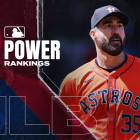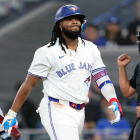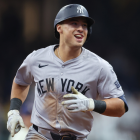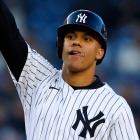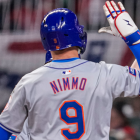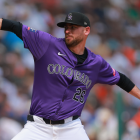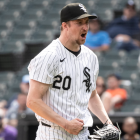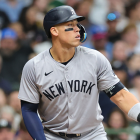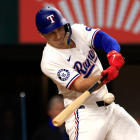With the 2016 MLB draft upon us, there are a certain, special few who are peddling this "tanking" nonsense.
That is, supposedly Major League Baseball has a problem (some have even called it "ugly") with tanking that needs to be resolved.
"Tanking" here means losing by design with the purpose of gaining higher draft picks in order to help turn a team around quickly. The problem with this thought process is there are landmines all over the place when it comes to this, our Major League Baseball.
First off, teams should be allowed to rebuild without completely losing on purpose. There's a difference. Look at the Brewers. They are rebuilding, but they kept Ryan Braun and Jonathan Lucroy around (to this point) while augmenting the veteran talent of Chris Carter and Aaron Hill heading into the season and entered Thursday with a 28-31 record -- which is only four games out of the second NL wild card spot.
Say whatever you want about their chances to contend moving forward (I don't like them) or about them possibly trading Lucroy and/or Braun (Lucroy will likely go, Braun has a decent shot, too), but this is not tanking. You can't be hovering around .500 more than two months into the season and be accused of losing on purpose. That's laughable.
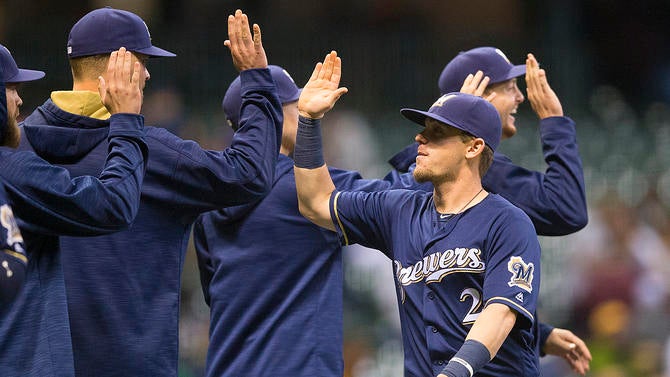
The Phillies are another team who some might have been accused of tanking before the season, but they are 29-31 and have many reasons for optimism moving into 2017 thanks to a bevy of exciting young talent -- some of which they acquired by trading veterans. Imagine that.
Even if someone was trying to lose, you need two central tenants to complain about teams "tanking:" Losing and doing it on purpose. You have to have both, not just one.
So let's take a look at the teams on pace to win fewer than 70 games. Why the cut off? Because no one in their right mind would accuse a 70-92 team of tanking. Having winners and losers is part of sports. There are Little League teams that go 4-12. Are they tanking?
Obviously, the talent pool is a bit different, but the point isn't. Losing doesn't mean tanking. So let's look at these losing teams and investigate if it looks like they are doing it on purpose (from the point of view of the front office, of course, as players don't try to lose).
Athletics (25-34)
They've gotten almost exaggerated underperformance from their entire rotation outside of Rich Hill, notably from All-Star Sonny Gray. I don't think we really need specifics here. The A's for years have operated as the most small-market team in baseball, swapping out great players close to a payday for younger guys. Sometimes it works, sometimes it doesn't. Billy Beane is never, ever tanking, however.
Verdict: Nope, not tanking.
Diamondbacks (26-36)
Arizona signed Zack Greinke to a $200 million-plus deal this past offseason while also trading for Shelby Miller. If they were actually tanking, wouldn't they have held onto last year's number one overall pick in Dansby Swanson instead of trading him for a big-league starting pitcher? C'mon.
Also, let's keep in mind A.J. Pollock was lost for the season the week before it began.
Verdict: Definitely trying to win, just not doing it
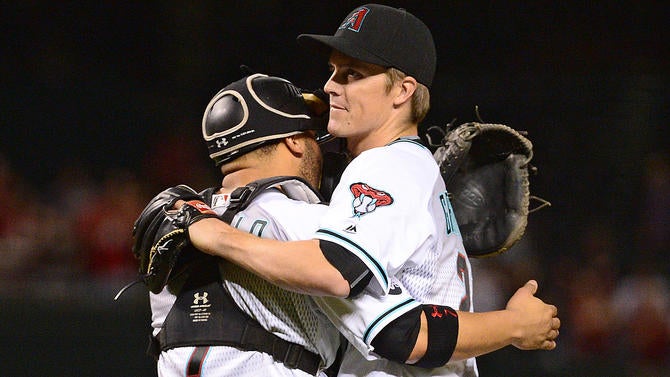
Padres (25-36)
We don't need to rehash the pre-2015 makeover of this team, do we? General manager A.J. Preller seems to have realized how ill-advised that was and is trying to offload payroll and restock his system. They still have, however, major-league talent in several areas. If they were tanking, they'd have done a lot more last offseason, like trading Tyson Ross and Andrew Cashner.
Verdict: A special case, but this is more a reversal of course than tanking.
Reds (22-37)
The Reds are awful and weren't expecting to compete this season, but there's a difference in this as opposed to tanking. Are they actually tanking? Well, they held onto Jay Bruce for the season. They still have Joey Votto -- sure, you could argue because of his contract, but after his 2015 season, they surely could have worked something out to rid themselves of him if they were tanking. Also, a litany of pitcher injuries (Homer Bailey, Anthony DeSclafani, Raisel Iglesias, Michael Lorenzon and more) is a major reason for the abysmal record. Let us also point out how much better the offense would be if Votto was hitting like he did last season.
Again, the Reds are rebuilding, but that's because of the state of the rest of the division. This doesn't mean they are trying to lose.
Verdict: Full-on rebuild, but not a tanking. I would accept respectful disagreement here in terms of semantics, though, because I doubt they thought they were going to be anything but bad.
Twins (18-40)
The Twins hung around in contention for nearly all of 2015 and made offseason moves like signing Byung-ho Park and getting catcher help (John Ryan Murphy) for Kurt Suzuki. Prospects like Bryon Buxton and Jose Berrios were supposed to mix in with the young talent (Miguel Sano, Eddie Rosario) and form a contender. They were expecting to contend.
Verdict: They tried to win, just failed miserably. Absent intent, this isn't even close to tanking.
Braves (17-42)
I think if we injected the front office with truth serum they'd say they expected to be the worst team in baseball. They actually have made moves that are setting them up for a nice turnaround for the future, but in determining a single-season tank job, this one seems easy.
Verdict: That's probably the closest we'll ever get to tanking.
So let's say there is one team tanking, maybe two. Is that actually a league-wide problem?
Some people like to point the Cubs and Astros as current great examples of what tanking can get you. Like with my above examples, the context says otherwise.
Cubs
Was essentially trading Andrew Cashner for Anthony Rizzo tanking? How about two months of Scott Feldman (and more of Steve Clevenger!) for Jake Arrieta and Pedro Strop? The roster was built in many different ways here and the tanking argument has to come down to this:
1. You believe the Cubs tanked in 2011 (under general manager Jim Hendry, mind you) in order to draft Albert Almora sixth overall, in front of Addison Russell, Corey Seager and Marcus Stroman.
2. You believe the Cubs tanked in 2012 in order to get Kris Bryant second overall in 2013. OK, that one is pretty strong, but let's keep a few things in mind. First of all, the Astros had the first crack at Bryant and took Mark Appel instead. Secondly, many, many people thought the Cubs -- with an admirable stash of position-playing prospects and a dearth of pitching prospects -- should have taken Jon Gray instead. Remember all those, "Who is going to pitch?" cries?
3. You believe the Cubs tanked in 2013 in order to get Kyle Schwarber fourth overall in 2014? So we're counting on three teams to pass on one player in this tanking narrative? Past that, remember the context that the Cubs "reached" to sign Schwarber under slot and because they loved his bat so much? Most scouting outlets had Schwarber ranked somewhere in the 20 range. Oh, and Schwarber is out for the season in 2016 and the Cubs still have the best record in baseball.
It's really a tough sell to say the Cubs achieved their success through tanking. It could be a part of the argument if you want, but it better be a real small argument. Trading veterans for prospects when out of the race isn't tanking, either, it's called smart planning. A bad team getting Russell for Jeff Samardzija (there was more to the deal, but these were the key parts) is good management.
Astros
They had three straight No. 1 overall picks, so if there's an argument for tanking, this would be it. Instead, they got Carlos Correa (sweet!), Appel (who they traded as part of a package for Ken Giles this past offseason and has yet to see the bigs; yuck) and Brady Aiken (who didn't even sign with them over a contract/medical dispute).
Two of the Astros three best homegrown players (with Correa) are Jose Altuve and George Springer. Altuve was signed as an amateur free agent out of Venezuela at age 17. Springer went 11th overall in 2011 (under the previous administration, not Jeff Luhnow's group) behind the likes of Danny Hultzen, Bubba Starling, Cory Spangenberg and Dylan Bundy.
To piggyback off that point, acting like the MLB draft is anything like, for example, the NBA draft shows an inherent misunderstanding of how developing talent in professional baseball works and how much more a crapshoot the MLB draft is. Just check out Mike Axisa's breakdown of the 2011 draft and this could be done with every draft.
Factor in the mix of high school players, junior college players, college juniors with negotiating leverage and college seniors without it and we have a very complicated event. Past that, there is an international signing period that also "rewards" teams with higher pools based upon finishing lower in the standings, but these are players 16 and 17 years old who won't sniff the majors for four or five years and -- much like the draft -- things change during development. Sticking with Altuve, the Astros signed him the year after they were 82-80.
We could go on and on with examples of where it benefited a bad team and examples of where the smarter teams won out anyway. Did you know the Rangers signed Rougned Odor the year after they went to the World Series, for example? Or how about this one: The year after the Mariners won 116 games, they signed a kid out of Venezuela named Felix Hernandez.
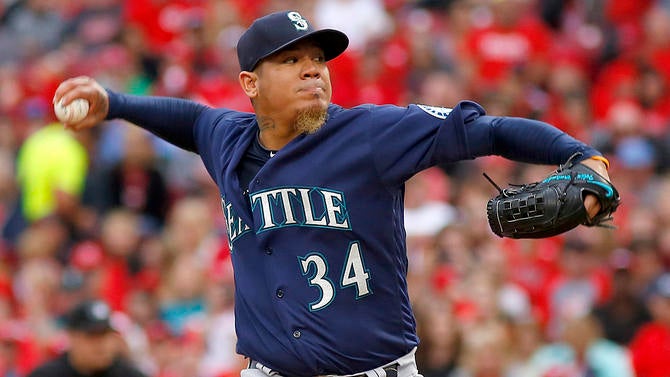
The point is, the international signing period is all educated guesswork, much like the draft, and having more bonus money doesn't necessarily mean a team will "win" the signing period. Hell, in this case -- unlike the draft -- the players actually have a choice.
No, MLB doesn't have a tanking problem. To say otherwise is to ignore how the game works and what is actually happening in it.














